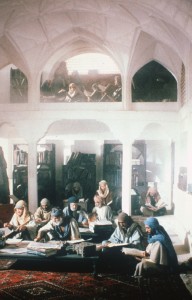The historical institute of secular and religious education, research academy, scientific laboratory and a global sanctuary of learning, Baitul Hikmat, marked an unforgettable chapter in the Muslim history of knowledge and sciences.
By Ghulam Rasool Dehlvi
Going by a recent survey, what all that the Arab writers, scholars and publishers hailing from 17 Arab countries collectively produced is far less than only the publications of University of Harvard. It is, obviously, a disturbing sign of all-round gloom and doom in the scientific spheres of the Arab countries. This sorry state of affairs, however, can be redressed if the present-day Muslims glance through the giant intellectual and scientific works initiated by their predecessors, drawing inspiration from them and thus kindling the light instead of cursing the darkness.
Regrettably, when we talk of today’s Arabs, they appear to be a people deeply steeped in intellectual decay, scientific degeneration, civil wars, terror incidents and violation of human rights. In majority of the Middle East countries, the news of positive developments and constructive achievements is hard to come by. It seems as if the Muslim world has disassociated with the modern era of scientific temperament. As a result, in the twenty first century, the academic researches, rational brainstorming, scientific experiments and empirical studies conducted in the Arab nations are branded as “secondary works”.
The historical institute of secular and religious education, research academy, scientific laboratory and a global sanctuary of learning, Baitul Hikmat, marked an unforgettable chapter of the Islamic history of knowledge and sciences. Founded by Muhammad al-Mansur, the second Abbasid Caliph in Baghdad, it was mainly aimed at rendering the valuable scientific works in Greek, Latin, Persian and Sanskrit into Arabic. Since inception, it had various departments concerned with different branches of science and arts. It cordially invited scholars with good flair for writing and translating from all over the world entertaining them with lavish treatment and productive liberality. Communications on issues of paramount importance were opened with both the Western and Eastern nations. Embassies were received from the Byzantine emperor, Charlemagne and the emperor of China (Faghfur) for the first time in history. These embassies played a crucial part in the development of the Baitul Hikmat, helping a scientific temperament flourish in the Muslim world.
When the caliph Mamun Rasheed came into power in the early 9th century, he paid greater heed to scientific projects being carried out in the Baitul Hikmat. It is because of Mamun’s active engagement with this institute that, Islamic history recalls him as the greatest patron of science in the cavalcade of Muslim rulers. With his insatiable passion for this intellectual flowering, he expanded translation works from various contemporary languages into Arabic and ordered the collection of the rare and substantial books from far and wide. In an endeavour to preserve the knowledge heritage of the world, he asked rulers and emperors of different countries to provide manuscripts of rare books on vital subjects to be documented and translated into different languages. Thus, plenty of manuscripts, rare books and compilations found in Persian, Greek, Syriac, Coptic and Sanskrit were collected and translated into Arabic in the Baitul Hikmat. When the Byzantine emperor was once defeated by the Abbasid caliph, one of the clauses pertaining to the peace treaty was that the emperor will allow the Muslim scientists and scholars to translate the rare books found in his empire and that the Caliph will depute some scholars specifically for this project. This is a glowing example of how a Muslim victor demanded scholarship as a price for his victory.
While the Greek works were disappearing in Europe, they were being preserved in Arabic to be retranslated later into Latin for a rebirth of the lost heritage of universal knowledge. The pioneering works of Philosophy, in particular, that originated in the ancient Greece were rendered into Arabic after they were collected from Athens. Along with these gigantic translation tasks, original thoughts and groundbreaking researches were carried out in various subjects, more notably in medicine, algebra, astronomy, arithmetic, optics, mechanics and history. As a result, Muslims were on their way to intellectual progress and scientific advancement, at a time when most of the European parts were passing through the dark ages. While the Europeans commonly assumed that the earth was flat, the size of the earth was calculated from the measurement of a degree on the shores of the Red Sea. Over the next two centuries, valuable works of Aristotle, Pythagoras, Archimedes and Hippocrates were rendered into Arabic, in addition to extensive translations from the Persian and Indian scientific literature. These translation works and original researches brought the then Muslims huge practical benefits in medicine, agriculture, finance, engineering projects and other areas defining their standing in global society.
In the Baitul Hikmat, numerous observatories were set up and then a number of ground breaking scientific inventions were produced that changed the shape of the world. Scholars engaged in accumulating collections of world knowledge brought out their own discoveries, drawing on Indian, Greek, and Persian texts. For instance, Abul Hasan, a great scientist associated with this institute, invented the telescope. By the middle of the 9th century, the Baitul Hikmat emerged as the largest repository of knowledge and sciences in the world, which launched empirical studies in science and humanities including philosophy, history mathematics, astronomy, medicine, alchemy and chemistry, zoology, geography and cartography.
(The writer is based in Delhi and can be reached at grdehlavi@gmail.com)


COMMENTS